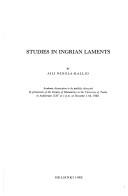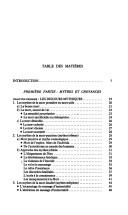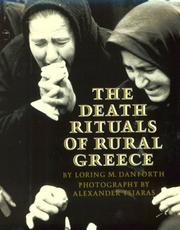| Listing 1 - 8 of 8 |
Sort by
|
Book
ISBN: 9060745647 Year: 1982 Publisher: Baarn In den Toren
Abstract | Keywords | Export | Availability | Bookmark
 Loading...
Loading...Choose an application
- Reference Manager
- EndNote
- RefWorks (Direct export to RefWorks)
German literature --- rouwverwerking --- Developmental psychology --- weduwschap --- Mourning --- Widows --- Book --- Experiences
Book
ISBN: 3491711037 9783491711037 Year: 1982 Volume: 11 Publisher: Düsseldorf Patmos
Abstract | Keywords | Export | Availability | Bookmark
 Loading...
Loading...Choose an application
- Reference Manager
- EndNote
- RefWorks (Direct export to RefWorks)
Grief --- 241.63*8 --- Mourning --- Sorrow --- Bereavement --- Emotions --- Loss (Psychology) --- Theologische ethiek: ziekte en dood --- 241.63*8 Theologische ethiek: ziekte en dood

ISBN: 951410451X Year: 1982 Volume: vol 234 Publisher: Helsinki : Suomalainen Tiedeakatemia :,
Abstract | Keywords | Export | Availability | Bookmark
 Loading...
Loading...Choose an application
- Reference Manager
- EndNote
- RefWorks (Direct export to RefWorks)
Laments --- History and criticism. --- Ingria (Russia) --- Social life and customs. --- Complancha --- Lamentations --- Elegiac poetry --- Mourning customs --- History and criticism --- Ingermanland (Russia) --- Ingria (R.S.F.S.R.) --- Inkeri (Russia) --- Izhora (Russia) --- Chants funèbres finnois d'Ingrie. --- Finse klaagliederen van Ingermanland.
Book
ISBN: 2222029147 Year: 1982 Publisher: Paris CNRS
Abstract | Keywords | Export | Availability | Bookmark
 Loading...
Loading...Choose an application
- Reference Manager
- EndNote
- RefWorks (Direct export to RefWorks)
Funeral rites and ceremonies --- -Inscriptions --- -Tombs --- -Epigraphs (Inscriptions) --- Epigraphy --- Inscription --- Paleography --- Epigraphists --- Funerals --- Mortuary ceremonies --- Obsequies --- Manners and customs --- Rites and ceremonies --- Burial --- Cremation --- Dead --- Mourning customs --- -Funeral rites and ceremonies --- Inscriptions --- Tombs --- Epigraphs (Inscriptions) --- Cryomation
Book
ISBN: 3876730805 Year: 1982 Publisher: München Klaus Renner
Abstract | Keywords | Export | Availability | Bookmark
 Loading...
Loading...Choose an application
- Reference Manager
- EndNote
- RefWorks (Direct export to RefWorks)
Ethnology --- Funeral rites and ceremonies --- Migration, Internal --- Nigeria --- Social life and customs. --- Internal migration --- Mobility --- Population geography --- Internal migrants --- Funerals --- Mortuary ceremonies --- Obsequies --- Manners and customs --- Rites and ceremonies --- Burial --- Cremation --- Cryomation --- Dead --- Mourning customs

ISBN: 2228130109 9782228130103 Year: 1982 Publisher: Paris : Payot,
Abstract | Keywords | Export | Availability | Bookmark
 Loading...
Loading...Choose an application
- Reference Manager
- EndNote
- RefWorks (Direct export to RefWorks)
Funeral rites and ceremonies --- Death --- Social aspects --- Africa, Sub-Saharan --- Religious life and customs --- 393 <6> --- -Funeral rites and ceremonies --- -#SJ/LH/(6) --- Funerals --- Mortuary ceremonies --- Obsequies --- Manners and customs --- Rites and ceremonies --- Burial --- Cremation --- Dead --- Mourning customs --- Dying --- End of life --- Life --- Terminal care --- Terminally ill --- Thanatology --- Dood. Dodengebruiken. Dodenritueel. Lijkverbranding. Begrafenis. Crematie. Rouw. Opbaren. Lijkstoet. Sterven. Dodenmaskers--Afrika --- -Philosophy --- -Africa, Black --- Africa, Subsaharan --- Africa, Tropical --- Africa South of the Sahara --- Black Africa --- Sub-Sahara Africa --- Sub-Saharan Africa --- Subsahara Africa --- Subsaharan Africa --- Tropical Africa --- -Africa, Sub-Saharan --- -Religious life and customs --- 393 <6> Dood. Dodengebruiken. Dodenritueel. Lijkverbranding. Begrafenis. Crematie. Rouw. Opbaren. Lijkstoet. Sterven. Dodenmaskers--Afrika --- #SJ/LH/(6) --- Philosophy --- Africa, Black --- Religious life and customs. --- 954 --- Cryomation --- Funeral rites and ceremonies - Africa, Sub-Saharan --- Death - Social aspects - Africa, Sub-Saharan --- Africa, Sub-Saharan - Religious life and customs --- Rites funeraires --- Afrique --- Anthropologie --- Mort (religion africaine)

ISBN: 0521248752 0521270375 1316040860 0511607644 9780521270373 9780511607646 9780521248754 Year: 1982 Publisher: Cambridge Cambridge University Press
Abstract | Keywords | Export | Availability | Bookmark
 Loading...
Loading...Choose an application
- Reference Manager
- EndNote
- RefWorks (Direct export to RefWorks)
It is a classical anthropological paradox that symbols of rebirth and fertility are frequently found in funerary rituals throughout the world. The original essays collected here re-examine this phenomenon through insights from China, India, New Guinea, Latin America, and Africa. The contributors, each a specialist in one of these areas, have worked in close collaboration to produce a genuinely innovative theoretical approach to the study of the symbolism surrounding death, an outline of which is provided in an important introduction by the editors. The major concern of the volume is the way in which funerary rituals dramatically transform the image of life as a dialectic flux involving exchange and transaction, marriage and procreation, into an image of a still, transcendental order in which oppositions such as those between self and other, wife-giver and wife-taker, Brahmin and untouchable, birth and therefore death have been abolished. This transformation often involves a general devaluation of biology, and, particularly, of sexuality, which is contrasted with a more spiritual and controlled source of life. The role of women, who are frequently associated with biological processes, mourning and death pollution, is often predominant in funerary rituals, and in examining this book makes a further contribution to the understanding of the symbolism of gender. The death rituals and the symbolism of rebirth are also analysed in the context of the political processes of the different societies considered, and it is argued that social order and political organisation may be legitimated through an exploitation of the emotions and biology.
Funeral rites and ceremonies --- Death --- Religion --- Fertility cults --- Funérailles --- Mort --- Fécondité --- Rites et cérémonies. --- Cultes --- Funeral rites and ceremonies. --- Death. --- Religion. --- Fertility cults. --- 291.23 --- Religion, Primitive --- Atheism --- God --- Irreligion --- Religions --- Theology --- Funerals --- Mortuary ceremonies --- Obsequies --- Manners and customs --- Rites and ceremonies --- Burial --- Cremation --- Dead --- Mourning customs --- Cults, Fertility --- Cults --- Dying --- End of life --- Life --- Terminal care --- Terminally ill --- Thanatology --- 291.23 Godsdienstwetenschap: eschatologische doctrines; leven na de dood --- 291.23 Godsdienstwetenschap: opstanding; reïncarnatie; metamorfose; zielsverhuizing; paradijs; hel; vagevuur --- Godsdienstwetenschap: eschatologische doctrines; leven na de dood --- Godsdienstwetenschap: opstanding; reïncarnatie; metamorfose; zielsverhuizing; paradijs; hel; vagevuur --- Philosophy --- Philosophical anthropology --- Physiology: reproduction & development. Ages of life --- Cryomation --- Social Sciences --- Anthropology --- Ritus i cerimònies fúnebres --- Religió --- Fecunditat

ISBN: 0691000271 0691218196 Year: 1982 Publisher: Princeton Princeton university press
Abstract | Keywords | Export | Availability | Bookmark
 Loading...
Loading...Choose an application
- Reference Manager
- EndNote
- RefWorks (Direct export to RefWorks)
This compelling text and dramatic photographic essay convey the emotional power of the death rituals of a small Greek village--the funeral, the singing of laments, the distribution of food, the daily visits to the graves, and especially the rite of exhumation. These rituals help Greek villagers face the universal paradox of mourning: how can the living sustain relationships with the dead and at the same time bring them to an end, in order to continue to live meaningfully as members of a community? That is the villagers' dilemma, and our own. Thirty-one moving photographs (reproduced in duotone to do justice to their great beauty) combine with vivid descriptions of the bereaved women of "Potamia" and with the words of the funeral laments to allow the reader an unusual emotional identification with the people of rural Greece as they struggle to integrate the experience of death into their daily lives. Loring M. Danforth's sensitive use of symbolic and structural analysis complements his discussion of the social context in which these rituals occur. He explores important themes in rural Greek life, such as the position of women, patterns of reciprocity and obligation, and the nature of social relations within the family.
#SBIB:39A10 --- #SBIB:39A72 --- Antropologie: religie, riten, magie, hekserij --- Etnografie: Europa --- Death --- Funeral rites and ceremonies --- Laments --- Social aspects --- History and criticism. --- Greece --- Rural conditions. --- Social life and customs. --- Complancha --- Lamentations --- Elegiac poetry --- Mourning customs --- Dying --- End of life --- Life --- Terminal care --- Terminally ill --- Thanatology --- History and criticism --- Philosophy --- Griechenland --- Grèce --- Hellas --- Yaṿan --- Vasileion tēs Hellados --- Hellēnikē Dēmokratia --- République hellénique --- Royaume de Grèce --- Kingdom of Greece --- Hellenic Republic --- Ancient Greece --- Ελλάδα --- Ellada --- Ελλάς --- Ellas --- Ελληνική Δημοκρατία --- Ellēnikē Dēmokratia --- Elliniki Dimokratia --- Grecia --- Grčija --- Hellada --- اليونان --- يونان --- al-Yūnān --- Yūnān --- 希腊 --- Xila --- Греция --- Gret︠s︡ii︠a︡ --- Alexiou, M. --- God. --- Haros. --- affines. --- binary oppositions. --- bitterness. --- black. --- burial. --- candles. --- clothes. --- confinement. --- corpse. --- decomposition. --- departure. --- earth. --- emergence. --- exhumation. --- family relationships. --- flowers. --- funeral service. --- graves. --- grief. --- harvest. --- immortality. --- incense. --- inheritance. --- kerchief. --- laments. --- lamps. --- liminality. --- marriage. --- memorial services. --- mother-in-law. --- naming system. --- obligations of living to dead. --- ommon-sense perspective. --- pain. --- paradise. --- religious perspective. --- Ritus i cerimònies fúnebres --- Mort --- Aspectes socials --- Vida social i costums.
| Listing 1 - 8 of 8 |
Sort by
|

 Search
Search Feedback
Feedback About UniCat
About UniCat  Help
Help News
News